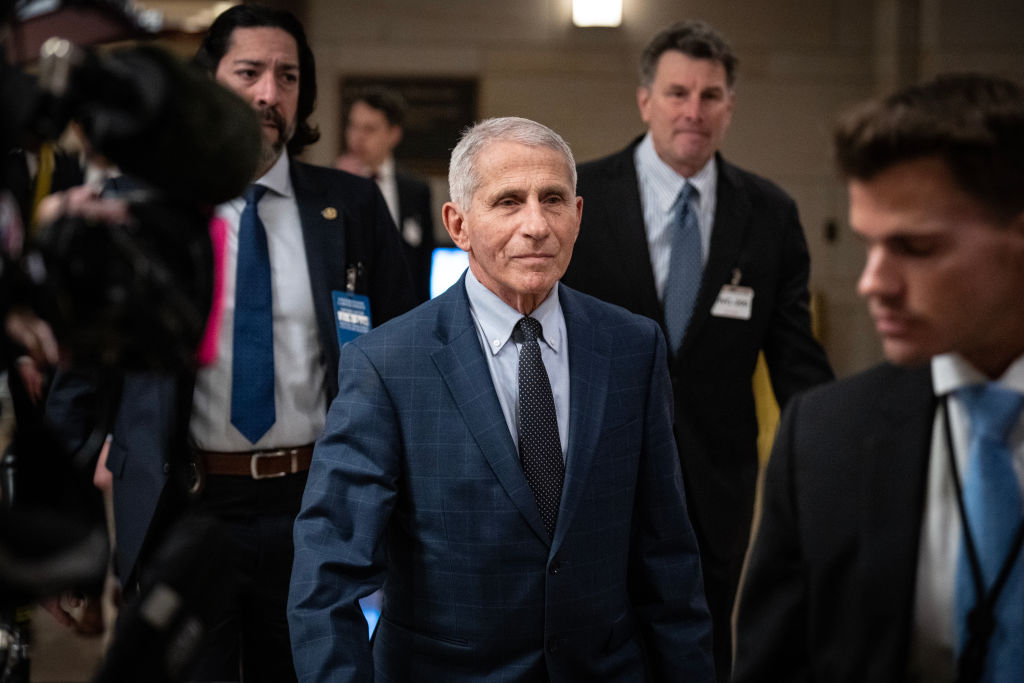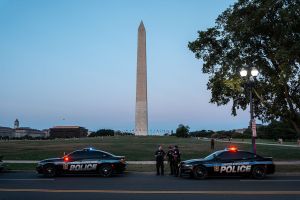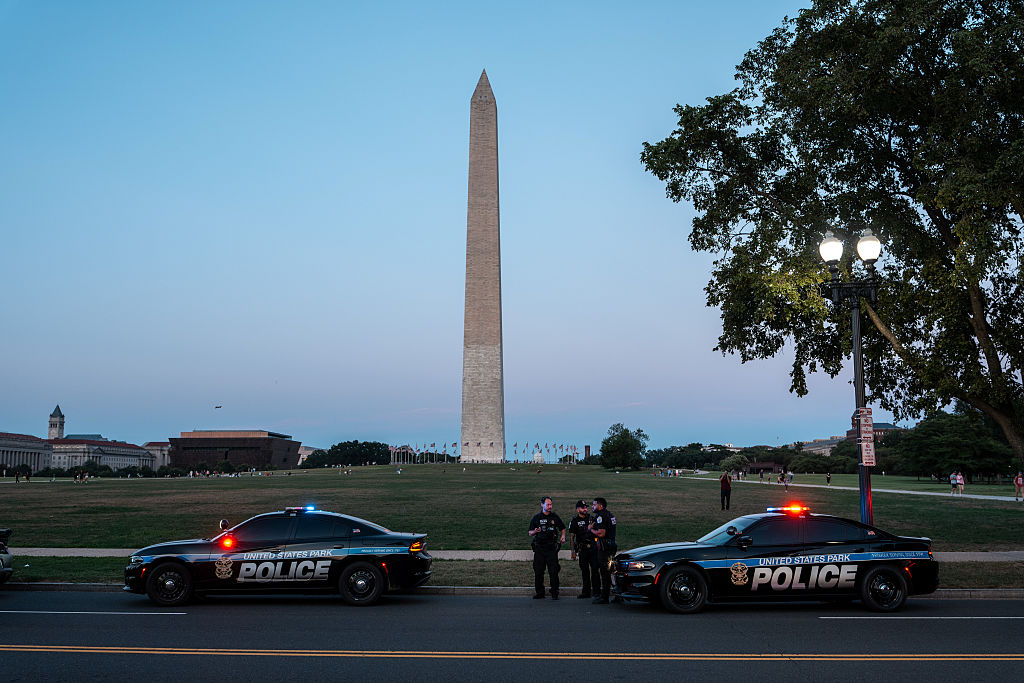As a new Covid variant, JN1, has cropped up across America, the public health officials who were at the forefront of the Covid-19 pandemic were hauled into Congress and pressed on lockdowns, the origins of the coronavirus, school closures and more behind closed doors.
The most prominent target, Anthony Fauci, was particularly grilled by the House’s bipartisan Covid Select Committee for fourteen hours over two days. Unreported until now is the lack of interest by the committee’s top Democrat, the confirmed conflicts of interests that an American scientist investigating Covid’s origins had and the carelessness with which Fauci ran his grant-making.
During the hearing, Fauci offered some criticisms of Peter Daszak, the controversial head of EcoHealth Alliance, who was the only American scientist on a 2021 trip to Wuhan organized by the World Health Organization. EcoHealth worked closely with the Wuhan Institute of Virology, and Fauci told the subcommittee that Daszak would have saved himself a lot of trouble if he had disclosed possible conflicts of interest.
Representative Mariannette Miller-Meeks, a longtime doctor and member of the Covid Subcommittee, said that some of her counterparts across the aisle were “fawning” over Fauci. For years, Miller Meeks ran the Iowa Department of Public Health, where she worked closely with Iowa’s ninety-nine counties, seeking to approach public health issues she dealt with like food-borne pandemics with the type of transparency that she says Fauci lacked.
Over the course of the hearing, it became clear to Miller-Meeks, who is also a member of the Republicans’ Doctors Caucus, that Fauci had become careless with his grant authorizations. “What surprised me was that of all the grants that he approved, he hadn’t really read through those grants,” she said. This “lack of due diligence and lack of paying attention to the small details was surprising, even though some of these grants weren’t in the millions of dollars, it’s still not [Fauci’s] money and you have a fiduciary responsibility to protect taxpayer money.”
One Republican in the room said that the maskless Fauci was almost drooled on by Democrats; the subcommittee’s top Democrat, Raul Ruiz, called the GOP’s demand for answers an “extreme fishing expedition.” This, Miller-Meeks said, is nonsense. It’s tough to even know how many fish Ruiz would have caught during the hearing, because one Republican staffer noted to me that he barely showed up at the most important hearing the select committee has done in all of Congress. Ruiz was only there for the final two or so hours; in contrast, Miller-Meeks said that her Democratic counterpart Ami Bera has approached the topic seriously.
On the GOP side, the committee’s counsel collected questions from its members to pose to Fauci, while some of the Democrats on the committee directly questioned the doctor.
Much of the ensuing coverage focused on Fauci confirming what many now believe to be common sense: that the theory that Covid-19 emerged from a lab is “not a conspiracy theory” and that guidance of six feet of social distancing “sort of just appeared.” But the extensive questioning produced other important discoveries, like Fauci criticizing Daszak and his careless grant-making.
While Fauci rose to prominence in the wake of his work combating the AIDS epidemic, some of his critics in Congress think that he grew complacent over the years, which culminated in him green lighting several controversial grants like sending almost $4 million to EcoHealth Alliance, which many believe was used on risky research at the Wuhan Institute of Virology.
Representative Ronny Jackson, another member of the Covid Committee and Fauci’s predecessor as chief medical advisor to the president, said that the Democrats “swooned” at Fauci. According to the Texas doctor, “Democrats spent hours shielding a man who wanted to play God, control the world, and cover up his own role in creating the pandemic. It was disappointing to witness the behavior displayed by the Democrats during the interview, and it was beneath any standard elected leaders should hold themselves to.”
The House’s oversight on the origins of the Covid stands in stark contrast with the Democratic-controlled Senate. Senator Ron Johnson, long one of Fauci’s fiercest foes in Congress, would probably love the opportunity to question Fauci, something that the Senate lacks urgency to tackle.
However, if given the ability to question Fauci under oath, Johnson told me he’d love to ask “him what urgent task NIAID deputy director [Hugh] Auchincloss had to perform following Dr. Fauci’s February 1, 2020 email where he says ‘it is essential that we speak this AM.’ I would also ask him to provide me access to the last fifty pages of his emails that were heavily redacted by HHS.” For years, Johnson has used his perch in the Senate to serve as one of Fauci’s fiercest congressional critics.
Fauci wasn’t alone in being hauled into Congress this week. Dr. Francis Collins, the former longtime National Institutes of Health director, sat with the Covid subcommittee for an entire day-long transcribed interview, also behind closed doors, that focused on many of the similar topics Fauci dealt with. In recent months, Collins has been working overtime to burnish his image as many view the response to Covid-19 as unnecessarily prolonged.
After the Great Barrington Declaration was published in October 2020, Collins emailed Fauci looking for a “quick and devastating published take down of its premise,” which many now view as common sense: protecting the elderly and vulnerable, while allowing younger, less at-risk populations to continue their lives. Last summer, Collins said that the declaration “could have been a great opportunity for a broad scientific discussion about the pros and cons” about lockdowns.
While pressed on his then-condemnation of the Great Barrington Declaration, which now has almost one million signatures from around the world, including tens of thousands of public health officials and medical practitioners, Collins actually doubled down on hating it, a subcommittee source said. He did, however, agree with Fauci that there’s likely no science for six feet of separation, and that the lab leak theory of Covid’s origins is not a conspiracy theory.
Beyond the Fauci and Collins duo, Lawrence Tabak, the former acting director of NIH, also spoke with the Covid Committee last week. Last year, the subcommittee pressed Tabak for information about “highly concerning allegations” that Dr. David Morens, a close Fauci advisor, improperly used a private email address and potentially deleted federal records,” as The Spectator previously covered.
As with Fauci, Miller-Meeks also found Tabak to be calm, “but it’s very clear that there was funding to EcoHealth to WIV that there was support for gain-of-function research.” Another committee source said that Tabak was even more forthright than Fauci in telling the subcommittee that Daszak had conflicts of interest while he was on the political trip to investigate the origins of the pandemic. Neither Fauci nor Tabak had any idea who submitted Daszak’s name for the trip; for his part, Daszak has said that the WHO reached out to him.
While Fauci’s next date with Congress is uncertain, he will be testifying in public before the year is over. Up next though, however, is a public address at Georgetown University next month.


























Leave a Reply